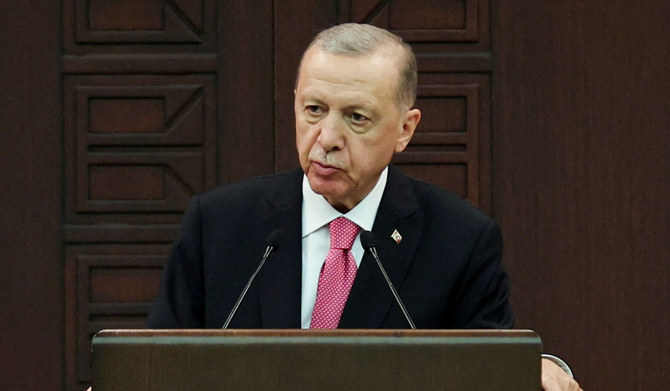Turkiye’s new modes of diplomacy with regional states

https://arab.news/bye29
Diplomacy is the key determining factor in developing relations between states, and it has various modes. Today, they include sports diplomacy, techno diplomacy, and drone diplomacy. All three were visible last week when Sheikh Mohammed bin Zayed Al Nahyan, president of the UAE, visited Turkiye.
Sheikh Mohammed was in Istanbul to attend the UEFA Champions League final at the Ataturk Olympic Stadium between Inter Milan and Manchester City — the English football club owned by his brother and vice president Sheikh Mansour. The UAE president was among the world leaders who congratulated Turkish President Recep Tayyip Erdogan after his re-election on May 28.
However, his visit involved more than just talks on ties between Ankara and Abu Dhabi. Erdogan used sports diplomacy as an effective instrument in bringing together Sheikh Mohammed and Libyan Prime Minister Abdul Hamid Dbeibah. At the match, the Emirati leader warmly greeted the Libyan premier. Ankara also used the event as an opportunity to push for further improvement in ties between Libya’s Tripoli-based government and Abu Dhabi, which backed its rival during the conflict. Ankara and Abu Dhabi were on opposite sides of the Libyan conflict. One of the best expected outcomes of ending the breakup between Turkiye and the UAE is easing the tensions in Libya, which was a central geographic spot for their rivalry.
Erdogan used sports diplomacy as an effective instrument in bringing together Sheikh Mohammed and Libyan Prime Minister Abdul Hamid Dbeibah.
Sinem Cengiz
Sports diplomacy was also used by Qatar during last year’s football World Cup, which played a significant role in reconciling states and nations. One of the most interesting scenes was when Erdogan and Egyptian President Abdel Fattah El-Sisi met and had an enthusiastic handshake at the opening ceremony, a rare sign of the thawing ties between the two countries. The jovial photo of the two leaders was clearly the outcome of the mediation conducted by Qatari Emir Sheikh Tamim bin Hamad Al-Thani. Through sports diplomacy, Qatar used the World Cup as an opportunity to act as a friendship broker between the Turkish and Egyptian leaders.
The second mode of diplomacy that grabbed attention last week was when Erdogan gave the UAE president a TOGG, which is Turkiye’s new indigenous electric vehicle. Azerbaijani President Ilham Aliyev was the first to receive one, and I believe Sheikh Mohammed was the second. The gift was symbolically significant because TOGG was used in the election campaign and it was a long-held dream of Erdogan to have Turkiye’s first national automobile.
Erdogan has long pushed industrialists to build a domestic car as part of his vision for making Turkiye an economic powerhouse. The Turkish leader aims to use TOGG as a tool of techno diplomacy. The images of the two leaders inside the car, with the Emirati leader in the driver’s seat, was a clear indication of how world leaders have started to use different modes of diplomacy to show the personal closeness between them. Leaders taking a car ride together without their entourage and security, and having discussion during the trip, has become an interesting trend. Another example was when Saudi Crown Prince Mohammed Bin Salman took Qatar’s emir on a car ride in AlUla back in 2021, with the former in the driver’s seat.
The third mode of diplomacy that was in action during last week’s visit was drone diplomacy. Turkiye’s drone exports have increasingly become an instrument of diplomacy. It is a well-known fact that cooperation on science and technology has the ability to further advance relations between states. States use techno-diplomacy as one of the ways in navigating tricky issues that could lead to competing interests. Just as with foreign policy, Turkiye's techno diplomacy started at home, but it later played out on the world stage.
Erdogan has long pushed industrialists to build a domestic car as part of his vision for making Turkiye an economic powerhouse.
Sinem Cengiz
The Gulf states have started to become important actors in Turkiye’s techno-diplomacy. This year, the Kuwait Defense Ministry and Turkish firm Baykar signed a contract worth $370 million to export Turkish drones to the Gulf country. Last year, Turkiye struck a $2 billion deal with the UAE to sell 120 of the Turkish drones. The Gulf interest in Turkish drones started with Qatar. In 2018, Baykar signed an agreement to export six armed unmanned aerial vehicles to Qatar's armed forces. This was followed by Oman. In 2021 the Omani and Turkish defense ministries reached a preliminary understanding for Muscat’s procurement of Turkish drones.
The conversation between the UAE president and Selçuk Bayraktar, the architect behind Turkiye’s drone diplomacy, was interesting. When Bayraktar said that he had flown with the Emirati leader’s Mirage fighter jet, the latter replied that they should fly together in the future. Drone diplomacy is likely to play an increasingly important role in advancing the strategic interests between Turkiye and the UAE, and with entire Gulf states in the coming years.
Thus, even more than Manchester City’s triumph in the Champions League, the scenes from the stadium, Erdoğan’s giving a TOGG to the Emirati leader, and talks on drones were very symbolic and interesting, indicating that Turkiye’s new modes of diplomacy are likely to start a new episode with the Gulf countries and the entire Middle East.
• Sinem Cengiz is a Turkish political analyst who specializes in Turkiye’s relations with the Middle East. Twitter: @SinemCngz









































